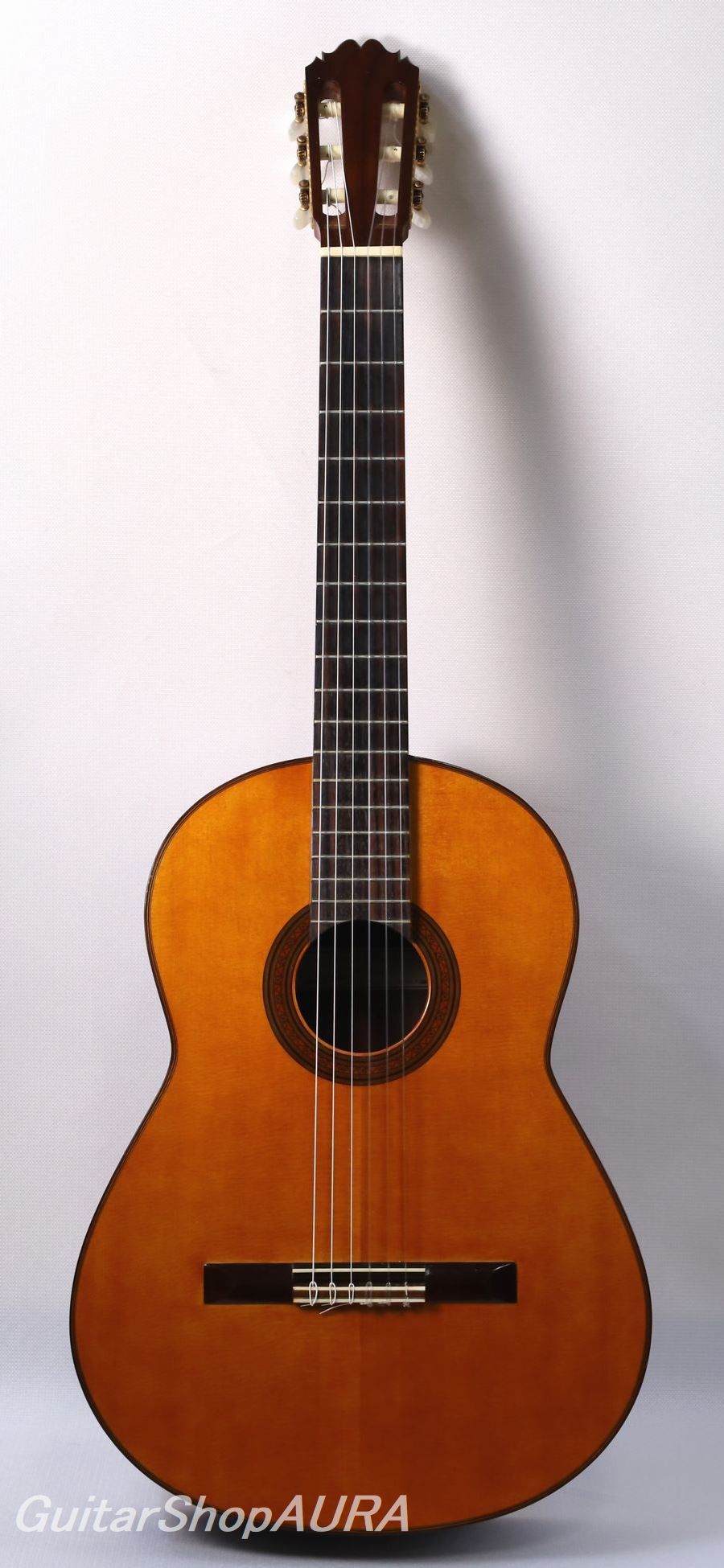
| Instrument | David Jose Rubio(PF) |
| Category | Imported Classical Guitars 〔Vintage〕 |
| Number/Model | |
| Scale length | 660mm |
| Country | England |
| Year | 1969Year |
| Top | Spruce |
| Side&Back | South American Rosewood |
| Condition※ | 7 |
| List price | INQUIRE |
| Price (tax included) | Please Inquire |
| option | with Hardcase |
Click to enlarge the photos below
Neck:Mahogany
Fingerboard:Ebony
Finish:Shellac
Tuning Machine:HOFNER
String height:1string 2.9mm/6string 3.7mm
[Profile]
David Jose Rubio (1934-2000), whose real name is David Joseph Spink, was a pioneer of classical guitar making in England from the 20th century onward, and remains a highly influential guitar maker today. His talent was not limited to making classical guitars, but since the 1970s he has also made harpsichords and baroque violins, contributing greatly to the field of classical music performance, which was then in the midst of a revival (his harpsichord was used by Gustav Leonhardt in his recording of Bach).
Rubio's workshop had many talented students, including Paul Fischer, E.B. Jones, Christopher Dean, and Kazuo Sato. He was an excellent mentor and inspiration to them.
Rubio's own career is very unique. As a young man, he wanted to study medicine and attended a technical school, but gave it up because of color blindness. He then moved to Spain, where he began playing flamenco guitar while interacting with the gypsy community (he learned to play from Pepe Martinez). He traveled around Spain and visited many guitar workshops. In Madrid, he went to the Conde Hermanos workshop, which at the time was still called Esteso, 'to talk about nothing as a guitarist,' and spent two years watching Faustino Conde build guitars. Rubio's guitar making shows the influence of Santos Hernandez and Domingo Esteso at its root.
Later, his skills as a guitarist were recognized, and he accompanied the group on a performance tour to New York City in 1961. After two years of night school and work in a furniture-making workshop, he established his own guitar workshop in Greenwich Village in 1963. Amazingly, he was able to build from the start an instrument that was extremely well finished, both in terms of construction and artistry, using only the techniques he had seen and memorized in the Spanish guitar workshop.
A few months after opening his workshop, Julien Bream, a virtuoso guitarist who was just visiting New York, came to Rubio's workshop to repair a Robert Bouchet guitar that he was using at a concert. Bream was pleased with the repair and, recognizing Rubio's talent, suggested that he make a Bouchet copy. Rubio instantly understood the structural features of this historical masterpiece and made a guitar that made excellent use of them. Bream became a patron of two Rubio-made guitars, one made in 1966 and the other in 1968, and used them on one of his famous recordings, '20th Century Guitar.
Rubio returned to England in 1967 and continued to make guitars in a building on Bream's property as his workshop. Bream's famous performance quickly brought him worldwide fame and demand, and in 1969 he moved his workshop to Semley. Paul Fischer joined the workshop staff here, and Rubio's instrumental genre quickly became more diverse. In the 1980s, Rubio relocated to Cambridge and expanded his lineup to include stringed instruments made using modern techniques.
Due to these circumstances, the number of classical guitars made by Rubio himself has decreased considerably since the 1970s, and the majority of Rubio guitars shipped are made by Fischer and other craftsmen. This has given guitars made by Rubio himself a special value, and the judgment of such guitars has often been a topic of discussion in the guitar market, but it is inappropriate to use the presence or absence of his autograph (inside the body or on the label) as a criterion for judgment, considering several examples.
The distinctive feature of his work is its tone and resonance. The high density of single notes and their sustain, depth and luster, delicacy and richness of expression, and overall balance and power all sound appropriate for classical expression. The style has changed little by little, with the New York to Semley period in particular being the most popular, but the works from 1970 onward are uniquely appealing because of their solid sound.
[Description]
David Jose Rubio 1969 is in stock. This is a valuable piece from the first PF stamping period under the David J. Rubio label, made by Paul Fischer, who was involved in its production from the beginning as a craftsman in this workshop.
The style is already different from that of the New York period, as the brand has undergone significant changes in a short period of time.
The sound with enhanced bass range is more profound, and the direction toward the 1970s can be seen. Deep single notes and high density are the hallmarks of this brand. They create a natural flow in melody and romantic changes in expression.
There is a history of crack repair on the sound board. The sound board has probably been shellac repainted in the past, and there are some scratches and dings around the sound hole, but it is in beautiful condition for its age.